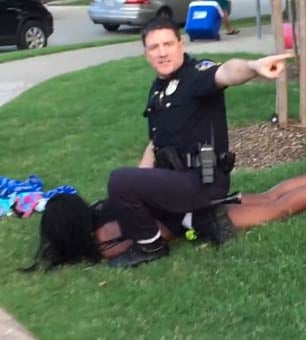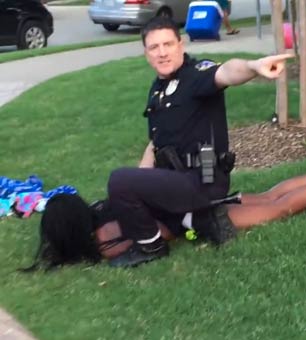Support justice-driven, accurate and transparent news — make a quick donation to Truthout today!
 The videotaped assault on 15-year-old Dajerria Becton by Officer Eric Casebolt serves as an enraging reminder of the terrorism Black women routinely suffered at the hands of white law enforcement and citizens. (Screengrab: Brandon Brooks/YouTube)In Alice Walker’s short story “The Flowers,” a little girl happens upon the decomposing body of a lynching victim while she is out picking flowers. Walker contrasts the light tranquility of the girl’s walk with the savagery of her discovery; suggesting that to be a black child is to never be shielded from the “adult” horrors of racist dehumanization. As the girl lays down her wreath of flowers Walker’s narrator declares that “the summer was over.” Summer’s metaphoric end signifies the brutality of a segregated nation in which black children are already othered, racialized, and criminalized in the pools, parks and recreational spaces that define white childhood innocence.
The videotaped assault on 15-year-old Dajerria Becton by Officer Eric Casebolt serves as an enraging reminder of the terrorism Black women routinely suffered at the hands of white law enforcement and citizens. (Screengrab: Brandon Brooks/YouTube)In Alice Walker’s short story “The Flowers,” a little girl happens upon the decomposing body of a lynching victim while she is out picking flowers. Walker contrasts the light tranquility of the girl’s walk with the savagery of her discovery; suggesting that to be a black child is to never be shielded from the “adult” horrors of racist dehumanization. As the girl lays down her wreath of flowers Walker’s narrator declares that “the summer was over.” Summer’s metaphoric end signifies the brutality of a segregated nation in which black children are already othered, racialized, and criminalized in the pools, parks and recreational spaces that define white childhood innocence.
The videotaped assault and sexual harassment of 15-year-old Dajerria Becton by a rampaging white police officer after a pool party in McKinney, Texas makes it clear that it continues to be open season on black women and girls. In the video officer Eric Casebolt grabs, straddles and violently restrains Becton while she is lying face down on the ground in a bikini. Ignoring her cries of pain and anxiety, he sadistically sits on her back while handcuffing her. Casebolt then pulls a gun on a few young people who attempt to intervene. Some of the good white citizens of McKinney have reportedly praised Casebolt’s thuggery.
The assault of Becton is an enraging reminder of the particular brand of sexual terrorism black women routinely experienced in the Jim Crow South at the hands of white law enforcement and ordinary white citizens. In her important book, At the Dark End of the Street, Danielle McGuire chronicles how institutionalized sexual violence informed black women’s civil and human rights resistance. Even as they were eclipsed in the mainstream civil rights movement by charismatic black male leaders, black women activists like Ida B. Wells, Recy Taylor, Claudette Colvin and Endesha Mae Holland drew on their experiences with sexual terrorism to galvanize black women organizers around the nexus of gender, race and class apartheid.
The McKinney incident underscores how even within the context of “recreation,” “normative” gender boundaries that automatically “feminize” young white women do not exist for young black women. Little black girls can never occupy the space of carefree, feminine innocence that little white girls expect as their birthright. They can never rely on the damsel in distress image to “rescue” them from American-as-apple pie state violence. According to the African American Policy Forum, black girls are suspended six times more than white girls and routinely vilified as aggressive menaces in school classrooms. It goes without saying that a black male police officer captured on video brutalizing and sitting on a bikini-clad teenage white girl would have been lynched before he returned to his precinct. It is tacitly understood that the scantily clad bodies of teenage white girls are sacrosanct cultural commodities; publicly off limits to law enforcement, privately available for the consumption of white heterosexist patriarchy. Within the public domain these are the bodies that must be protected at all costs—from potential violation by predator white men and from the imagined, ever present “threat” of violent encroachment by men of color.
Socialized to see black women as chattel, thuggish police officers play on misogynist white supremacist stereotypes to justify their criminality under the color of law. After months of community agitation, last summer’s heinous videotaped beating of Marlene Pinnock, a middle age African American homeless woman, by a white California Highway Patrol officer led to his firing. Nonetheless L.A.’s black female district attorney has not seen fit to file criminal charges against him. And the recent conviction of white female LAPD officer Mary O’Callaghan for assault—rather than involuntary manslaughter—in the death of 35 year-old Alesia Thomas is an anemic substitute for justice.
The McKinney police thug has been suspended from duty but there should be a national push for prosecution. As with police beatings and murders of men of color, there is no special dispensation for black women victims of state violence, no “weaker sex” clause that mitigates the brutalization of black women’s bodies as hypersexualized policed space. For black girls in the hallowed idyllic spaces that enshrine the privileges of white youth, summer is always over.
A terrifying moment. We appeal for your support.
In the last weeks, we have witnessed an authoritarian assault on communities in Minnesota and across the nation.
The need for truthful, grassroots reporting is urgent at this cataclysmic historical moment. Yet, Trump-aligned billionaires and other allies have taken over many legacy media outlets — the culmination of a decades-long campaign to place control of the narrative into the hands of the political right.
We refuse to let Trump’s blatant propaganda machine go unchecked. Untethered to corporate ownership or advertisers, Truthout remains fearless in our reporting and our determination to use journalism as a tool for justice.
But we need your help just to fund our basic expenses. Over 80 percent of Truthout’s funding comes from small individual donations from our community of readers, and over a third of our total budget is supported by recurring monthly donors.
Truthout has launched a fundraiser to add 340 new monthly donors in the next 5 days. Whether you can make a small monthly donation or a larger one-time gift, Truthout only works with your support.
